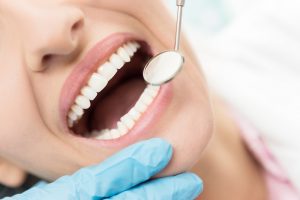
Over 80 percent of adults in the United States suffer from some degree of gum disease. Because it is considered a “silent” disease, up to 60 percent afflicted aren’t even aware of this condition.
The best way to know for sure whether or not you suffer from gum disease is to go to the dentist. They can provide a thorough evaluation to determine if you need to be treated for this condition.
However, you also have to take steps to keep your gums healthy.
Keep reading to learn what you can do, throughout the year, to maintain healthy gums.
Brushing your teeth is the first step in having healthy gums (also referred to the soft tissue of your mouth). Some of the guidelines that are recommended by the ADA include:
If you brush too vigorously, this can actually cause more harm than good, so be sure to follow the above guidelines.
If you want healthy gums, you have to floss at least one time a day. This will help to remove the food and plaque that can’t be removed by your toothbrush.
It doesn’t matter when you opt to floss. You can do it any time of day; the key is to do it.
Smoking makes you more susceptible to gum disease.
Why?
Because it weakens your immune system. As a result, the CDC recommends that you stop smoking right away to reduce the likelihood of gum problems. Using other types of tobacco products can also increase your risk of gum issues.
Usually, these can be found at your local drugstore. This type of mouthwash can help to reduce plaque while preventing and reducing gingivitis and reducing the development of tartar.
Additionally, rinsing your mouth helps to remove any debris or food particles in your mouth. While this is important, mouthwash is not a substitute for brushing and flossing daily.
It’s a good idea to look for the ADA seal on the mouthwash you ultimately choose. It means it has been tested and is both safe and effective.
It’s important to make and keep dental appointments at least twice a year. By getting a professional cleaning, you can have all the tartar and plaque on your teeth removed.
Additionally, a dentist can evaluate the health of your gums to determine if any type of treatment for gum disease is needed.

Flossing prevents gum disease, plaque, bad breath, and tooth decay by getting rid of debris and bacteria that a toothbrush or mouthwash can’t reach. You should floss once per day to keep your teeth healthy and increase blood circulation in your gums. It only takes a few minutes, and you can take care of it while you relax on your sofa or watch TV. Here are the steps you should take when you floss your teeth.
There are many types of floss available, including products with or without wax, dental tape, and thinner comfort floss. You can also use a floss holder or pick to reach your back teeth more easily. Choose a fun floss flavor like coffee, bacon, or absinthe. You can also use flavorless floss or a more common flavor like mint or cinnamon.
You should use about 18 inches of floss every time you clean your teeth. Wind the ends of the floss around one finger on each hand and hold the floss tightly between your fingers. Guide the floss between your teeth with a gentle rubbing motion, and move it against the sides of each tooth.
You should use a new section of floss in the space between each tooth. That way, you can keep bacteria from spreading and fight cavities more effectively. Make sure you don’t snap or press the floss into your gums because it could cause bleeding, irritated gums, or even infections. If you just started flossing regularly, some bleeding is normal. However, you should see your dentist if it lasts for more than a week or two.
No matter how often you brush, floss, and gargle (mouthwash), there are some dental deposits that cannot be removed at home. A mixture saliva, food particles, and bacteria, dental plaque is the leading cause of gum disease and tooth decay. There’s some of it in all of our mouth, but it can be kept in check with a comprehensive oral care routine. However, when dental plaque hardens and becomes tartar, all of the brushing and flossing in the world will not get rid of it. You must have your teeth professionally cleaned to protect your oral health.
A painless dental procedures that typically takes under one hour, a typical cleaning starts with an ultrasonic cleaner and a water sprayer; two tools that help loosen plaque and tartar deposits. They can then be safely removed with a metal instrument called a hand scraper. Because they are calcified, tartar deposits are more difficult to remove, especially when they spread under the gumline. After the deposits have been scraped off, your dentist will brush your teeth with a special rotary toothbrush and a gritty type of toothpaste that polishes teeth to a high shine.
All adults should have their teeth professionally cleaned at least once a year, according to the American Dental Association (ADA).

Looking after your teeth is not just about selecting the best dentist in your local area. It’s a constant process that requires dedication and discipline. Here are some top tips to help you manage your oral hygiene in the correct manner:
Your dental health is an extremely important aspect to living a healthy life, and it requires more care than simply brushing and flossing. Consider the below steps to promote a healthy and beautiful smile.
Visiting the dentist every six months is one of the most important things you can do for your health and looks. Not only does it keep your mouth feeling clean and looking great but it also catches problems before they become severe. If you were wondering why you should visit the dentist, here are a few reasons to make it a habit.
According to the Centers for Disease Control, a staggering 47 percent of American adults have gum disease, and about 50,000 will develop oral cancereach year. However, you can limit these diseases’ detrimental effects with a routine trip to the dentist. During a checkup, the dentist can identify these two conditions. Early detection is one of the most effective ways to keep these diseases from causing considerable health problems.
Although flossing and brushing regularly can limit the holes in your teeth known as cavities, a trip to the dentist is just as important. Using X-rays, dentists can see if you have any cavities, as well as identify potential problem areas. The dentist will also use a variety of tools to remove tartar and plaque from your teeth, which are the two leading causes of cavities.
Many everyday habits can impact your oral and dental health, but you might not realize it until the dentist points it out to you. Little habits such as chewing ice, biting your nails, or even brushing your teeth too hard can have adverse effects on your teeth. During your dental visit, you can see the damage firsthand and find ways to curb the behavior.

Poor diet is to blame for most dental issues. From cavities to root canals to plaque and gingivitis, consuming certain foods and beverages affects the health of your teeth and gums. How does it happen? Here’s a quick and dirty refresher course.
Just about everything you eat contains some form of sugar, including milk, cereals, breads, fruits, and even vegetables. These sugars fuel a reaction that destroys the hard, thin outer layer of tooth tissue called enamel. As a result, they are the leading cause of dental caries (cavities), enamel erosion, and tooth loss.
Since it is in most of the foods and beverages we ingest, avoiding sugar is almost impossible. The best we can do is to keep consumption at a healthy level, or at least at one that will not compromise our oral health. But what exactly is a healthy level?
You don’t have to worry about the sugar that is naturally found in most foods. Human beings have been enjoying milk, carrots, and apples for a long time, and all of them contain sugars. But they also contain vitamins and nutrients your body needs. On the flipside, foods that contain added sugars, such as soft drinks, candies, and cookies, do not have much else besides sugar. These comestible also contain much higher levels of sugar than foods that it naturally occurs in, since their makers add sugar to make the product sickeningly sweet.
Part of having a bright, white smile is maintaining healthy gums. When plaque builds up on a person’s teeth, the gums become inflamed, acondition called gingivitis. If left untreated,gingivitis can turn into periodontitis, a more serious condition that often leads to bone and tooth loss.
Removing plaque build up is a principal reason why regular dentist visits are so important. They help you avoid more invasive gum treatment. If you want an experienced, knowledgeable dentist in NYC, contact Dr. Mal Braverman. To schedule a free consultation, Call Us At 212-688-3838 Today!
If you are in the early stages of gum disease, the dentist or hygienist may have to do a gum treatment called scaling and root planing. During the procedure, plaque and calculus are removed at the root surfaces of the teeth and in the deep periodontal pockets of the gums. If your gums need a lot of work, the dentist may give you a local anesthetic to keep you comfortable.
Sometimes, scaling and root planing is enough to stop the progress of gum disease, but in many cases, patients must receive further gum treatment.
It’s important to seek treatment as soon as possible to minimize permanent damage to your gums. Although your regular dentist can perform a scaling and root planing procedure, he may refer you to a periodontist for further gum treatment in NYC. At our office, we can offer periodontist treatments on-site.
A periodontist is trained in preventing, diagnosing and treating periodontal disease. This requires knowledge of the latest research and techniques for treating gums.
Dr. Braverman’s dental office in NYC has a periodontist on-staff for your convenience. This ensures that your gum treatment plan is effective. Keeping your gums healthy prevents tooth loss and other health problems.
When patients show signs of advanced gum disease, a periodontist can perform many restorative procedures. Gum graft surgery repairs receding gums and prevents bone loss. Regenerative procedures become necessary when the bone that supports teeth becomes destroyed due to periodontal disease.

Beyond the obvious causes of poor dental hygiene of tooth decay, gum disease and bad breath, not brushing and taking care of your teeth could also have consequences for more serious illness down the road including Alzheimer’s, pancreatic cancer and heart disease.
In 2010, researchers from NYU concluded that there is a link between gum inflammation and Alzheimer’s disease.
In 2007, a Harvard research team found strong evidence on a link between gum disease and pancreatic cancer. The two types of gum inflammation associated with pancreatic cancer in the study were periodontitis, which can affect the tissue that supports the teeth and can cause loss of bone around the base of the teeth, and gingivitis, where the tissue around the teeth becomes inflamed.
In 2008, researchers in Ireland found that people with bleeding gums from poor dental hygiene could be increasing their risk of heart disease. The research showed that heart disease risk was increased in people with bleeding gums because bacteria from the mouth is able to enter the bloodstream and stick to platelets, which can in turn form blood clots, therefore interrupting the flood of blood to the heart and thus triggering a heart attack.
The American Dental Hygienists Association recommends that we should brush twice daily for at least 2 minutes each time.
Learn more and read the full article here.
Stay on top of your dental hygiene and schedule your visit with Dr. Braverman today!